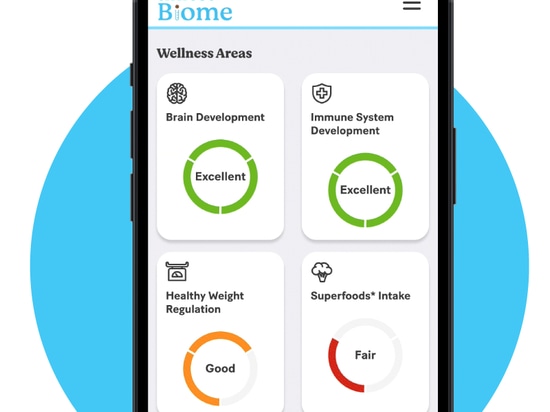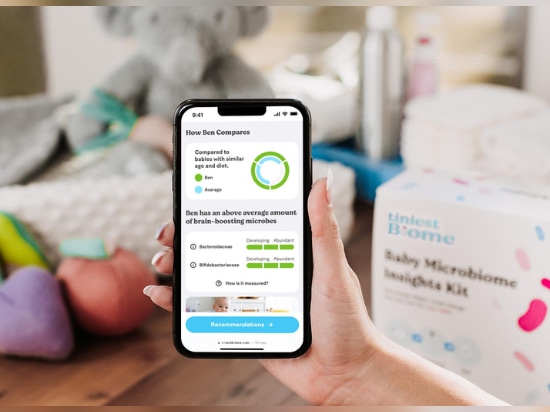
#Product Trends
Get the Scoop on Your Child’s Poop
This service turns poopy diapers into an interesting healthcare opportunity.
Nobody likes dealing with poopy diapers. But TerraCycle Discovery has created a microbiome testing service that can turn that chore into an opportunity to measure a child’s gut health. The company’s tiniest Biome service evaluates the microbial content of a poopy diaper and then provides parents with appropriate wellness recommendations for their child.
According to TerraCycle Discovery, research has shown that microbes in a baby’s gut can affect healthy brain and immune system development, and weight regulation. And because the gut microbiome for children under three years of age can still be altered and influenced by diet and exercise, it is important to know exactly how it is developing.
TerraCycle Discovery has created an easy way for parents to get this information with its tiniest Biome service, and it is as simple as putting a poopy diaper in a box and dropping it off at UPS.
“The kit is a box that contains the instructions and a bag to put the diaper in,” said Gregg Robideau, PhD, head of R&D at TerraCycle Discovery, in an interview with MD+DI. “It’s just a matter of waiting for the right time to get a diaper with some stool in it and then rolling up that diaper like you always would, but instead of putting it in the trash, you can put it into the bag and the box and it's postage-paid, ready to go.”
Robideau said tiniest Biome was created in answer to parents wanting to know more about how to best provide nutrition for their children.
“Things like brain development and immune system development and healthy weight are things that parents have told us that they really value,” he said. “We are looking for key bacteria families that are known to be really important in the gut microbiome and that will contribute to the child's overall health as they grow. And so, we've identified a key selection of those types of bacteria that are really well studied in well-known literature and are prevalent among the general population.”
The tests include bacterial families such as Akkermansiaceae, Bacteroidaceae, and Bifidobacteriaceae.
Total gut bacteria present in the stool is also measured and is used to estimate relative abundance for each of the family/genus tests.
Test results arrive in four to six weeks, Robideau said.
“For each of our testing targets there will be a meter essentially that shows the way a child falls on that average and it's compared to other children in their age group,” he said, noting that the child’s diet is also considered. “That transition into eating solids has a major impact on the gut bacteria.”
Through tiniest Biome, parents are given recommendations to show what they can do about their child’s gut microbiome.
“We give them tips and some recipes or types of foods that contain the prebiotics that will help boost or augment these good bacteria,” Robideau said. “Conversely, in the case of agitating bacteria, we have recommendations that can steer them towards helping to bolster the other good bacteria, which will in turn balance the agitating bacteria.”
Robideau said the company really wanted to include in its service something different from other child gut health tests.
“The ease of use and the ease of understanding the recommendation is there,” he said.
TerraCycle Discovery’s tiniest Biome is currently available throughout the contiguous United States, with the exception of New York and Delaware.
Microbiome testing isn’t just for baby poop
Gut microbiome testing is becoming an increasingly popular option for gaining better insight into our overall health. But until now, the process of collecting stool for such testing (in adults) involved an awkward poop-scooping step that deterred many users from going through with the test.
Thanks to a conversation over beers, scientists at Thorne HealthTech have developed a much more convenient method of collecting stool for its Gut Health Test. The company recently relaunched its test to include a specially designed Microbiome Wipe with each of its microbiome testing kits.
"The way that everyone has to go about doing a microbiome test these days – this is on our previous tests as well as basically everything in the space – is you’ve got to essentially poop in a bucket, or on a piece of paper or something. You then have to take a little spoon or something like that and do the poop-and-scoop step, and basically everyone hates it," Nathan Price, chief scientific officer at Thorne HealthTech, told MD+DI in an interview last year.
Price said the idea for the Microbiome Wipes came from a conversation over drinks one night between colleagues. As the discussion turned to the dreaded poop-and-scoop method of stool collection for microbiome testing, Price said they began to ask themselves, 'What if you could just wipe like normal, and you didn't have to change anything? Could we design a wipe that would enable us to get rid of that step, the poop-and-scoop that nobody likes?'
From there, the team had to solve several technical challenges such as materials to use for the wipe that would be soft on the skin and be biodegradable, as well as determining the ideal solution in which to dissolve the wipe in and making sure the container that held the solution and wipe would maintain a tight enough seal after the user drops the wipe in and puts the lid back on.
All that work led to the final product, which is a kit that includes a glove for the user to wear during wiping, an individually wrapped biodegradable Microbiome Wipe, and a container for the used wipe. Price said it takes about 10 seconds for the wipe to dissolve in the solution, and the DNA is preserved just as well as with the previous poop-and-scoop method of sample collection.
Thorne's microbiome testing product, the Gut Health Test, is designed to provide a detailed analysis of factors related to digestion, inflammation, the nervous system, immune function, and the presence of pathogens. By mapping and integrating results of the test, Thorne offers customers a personalized action plan intended to target gastrointestinal discomfort and optimize wellness.
“Gut health is fundamental for all health, including mental, emotional, and physical health. A microbiome imbalance in the gut contributes to gastrointestinal disorders, chronic disease, poor nutrient absorption, and even drug resistance that prevent some medications from working,” Price said. “The inclusion of the Microbiome Wipe in our Gut Health Test provides an opportunity for users to access testing without the discomfort and hygiene concerns of traditional stool sample collection. This new approach to gut health testing will arm our customers with the data and personalized solutions they need to live healthier for longer.”
In clinical studies, the Microbiome Wipe showed increased efficacy compared to traditional stool collection methods for microbiome testing, Thorne noted. The study showed that the Microbiome Wipe performed comparably to a commercial room temperature DNA/RNA preservation kit and was also very similar to the gold standard frozen samples for most metrics. Additionally, the same study demonstrated that the wipe collection method enables easy access to sampling, testing, and genetic analysis in clinical trials, home use, or even in remote environments given the wipe method’s stability. The results of the clinical study are published in Frontiers in Immunology.
"It's been fun to see it go from a conversation over beers one night to a finished product that we think is going to be a big game changer for the microbiome industry," Price said.
The microbiome testing kit is regulated under a CLIA waiver because it is not intended as a diagnostic test, but Price said there may be potential future indications that would be regulated by FDA.
"We're interested in partnerships with organizations that are doing clinical tests because we think this technology is a better experience for stool sample in general," he said.



